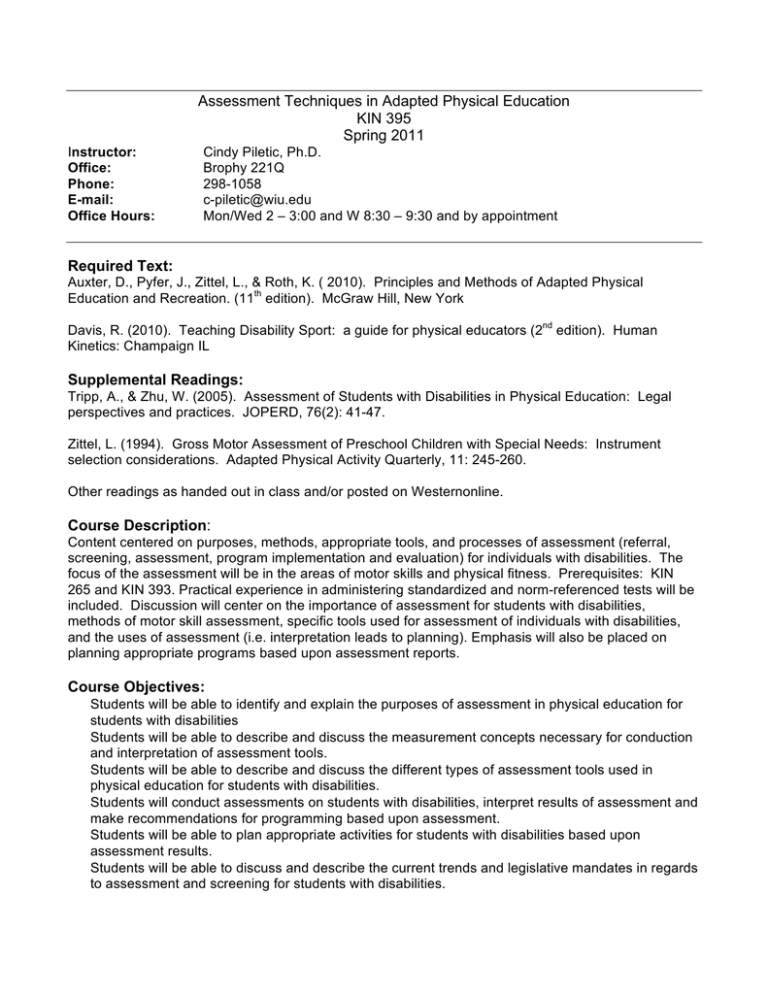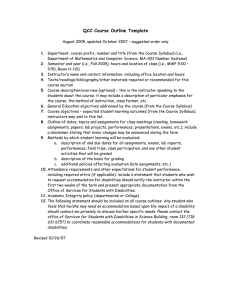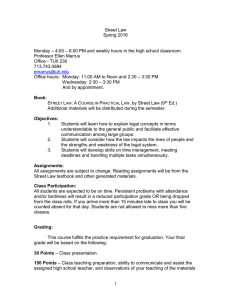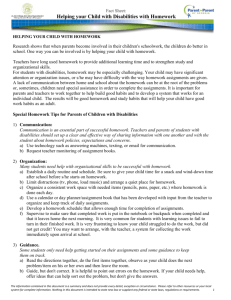Assessment Techniques in Adapted Physical Education KIN 395 Spring 2011
advertisement

Assessment Techniques in Adapted Physical Education KIN 395 Spring 2011 Instructor: Office: Phone: E-mail: Office Hours: Cindy Piletic, Ph.D. Brophy 221Q 298-1058 c-piletic@wiu.edu Mon/Wed 2 – 3:00 and W 8:30 – 9:30 and by appointment Required Text: Auxter, D., Pyfer, J., Zittel, L., & Roth, K. ( 2010). Principles and Methods of Adapted Physical Education and Recreation. (11th edition). McGraw Hill, New York Davis, R. (2010). Teaching Disability Sport: a guide for physical educators (2nd edition). Human Kinetics: Champaign IL Supplemental Readings: Tripp, A., & Zhu, W. (2005). Assessment of Students with Disabilities in Physical Education: Legal perspectives and practices. JOPERD, 76(2): 41-47. Zittel, L. (1994). Gross Motor Assessment of Preschool Children with Special Needs: Instrument selection considerations. Adapted Physical Activity Quarterly, 11: 245-260. Other readings as handed out in class and/or posted on Westernonline. Course Description: Content centered on purposes, methods, appropriate tools, and processes of assessment (referral, screening, assessment, program implementation and evaluation) for individuals with disabilities. The focus of the assessment will be in the areas of motor skills and physical fitness. Prerequisites: KIN 265 and KIN 393. Practical experience in administering standardized and norm-referenced tests will be included. Discussion will center on the importance of assessment for students with disabilities, methods of motor skill assessment, specific tools used for assessment of individuals with disabilities, and the uses of assessment (i.e. interpretation leads to planning). Emphasis will also be placed on planning appropriate programs based upon assessment reports. Course Objectives: Students will be able to identify and explain the purposes of assessment in physical education for students with disabilities Students will be able to describe and discuss the measurement concepts necessary for conduction and interpretation of assessment tools. Students will be able to describe and discuss the different types of assessment tools used in physical education for students with disabilities. Students will conduct assessments on students with disabilities, interpret results of assessment and make recommendations for programming based upon assessment. Students will be able to plan appropriate activities for students with disabilities based upon assessment results. Students will be able to discuss and describe the current trends and legislative mandates in regards to assessment and screening for students with disabilities. APENS standards that will be addressed within the course: 1. Human development 4. 2. Measurement & Evaluation 5. 3. Unique attributions Assessment Instructional design and planning Attendance Attendance is expected for all class meetings. Students may miss one class throughout the semester without any penalty. Each class missed after the first absence will result in a drop in their grade (each additional absence will drop ½ letter grade, up to 4, more than 4 absences over and above the initial absence will result in failing the course). Students are required to be here on time. Different activities, pop quizzes will be done in class and points will be earned that will count toward participation points. Thus if students have more than two misses and also miss an in-class activity they will be losing points in two different areas. It is important for students to attend class. Policy on Electronic Devices in class All cell phones, Ipods and other electronic devices (except laptops) will be turned off prior to coming into the classroom and out of site during class. Students need to be cognizant of this prior to class, so not to interrupt the class. Policy on Written Work: < All work is to be typewritten and double spaced unless otherwise indicated. < All written work must be submitted during class on the day the assignments are due to receive full credit. Assignments turned in before 4:00 pm on that day will be penalized 20% of the potential points for that assignment. NO WRITTEN WORK WILL BE ACCEPTED AFTER 4:00 PM THE DAY THAT THE ASSIGNMENT IS DUE. THERE IS NO EXCEPTION TO THIS POLICY. Students need to plan ahead for problems with computers, printers, etc. < All written work must be handed in as a hard copy, unless otherwise identified by the instructor or submitted via Western Online as an “assignment”. Thus, no assignments will be accepted as email attachments, turned in because the student missed class. < POINTS WILL BE DEDUCTED FOR MISSPELLINGS AND OBVIOUS POOR GRAMMAR. < Each written assignment will be graded for content, written expression, clarity, organization, meeting the demands of the assignment instructions, and grammar. Rubrics and/or specific assignment sheets will be made available for most assignments either in class or through the manual for the motor clinic. < Homework assignments submitted to the instructor at least 4 days prior to the assigned due date will be reviewed and returned for possible corrections. Academic dishonesty Students of the University must conduct themselves in accordance with the highest standards of academic honesty and integrity. Academic dishonesty by a student will not be tolerated in the academic area and will be treated in accordance with the policy in the current faculty handbook. Penalties for such behavior include punishment up to and including failure in the course and referral to the University Academic Ethics Committee. Examples of Academic Dishonesty include taking off in class after attendance has been taken but the activity has not been completed, signing other student's names to the role (both students will be punished), copying of other's written work (both students will be punished), completing assignments as a group when assignments are meant to be individually done. Student Rights and responsibilities: See the web address: http://www.wiu.edu/provost/students ADA policy "In accordance with University policy and the Americans with Disabilities Act (ADA), academic accommodations may be made for any student who notifies the instructor of the need for an accommodation. For the instructor to provide the proper accommodation(s) you must obtain documentation of the need for an accommodation through Disability Support Services and provide to the instructor. It is imperative that you take the initiative to bring such needs to the instructor's attention, as he/she is not legally permitted to inquire about such particular needs of students. Students who may require special assistance in emergency evacuations (i.e. fire, tornado, etc.) should contact the instructor as to the most appropriate procedures to follow in such an emergency. Contact Disability Support Services at 298-2512 for additional services." Background Check – Prior to any field work in schools/agencies, candidates are to supply verification of having completed both an Illinois State Police and FBI fingerprint background investigation through the Center for the Preparation of Education Professionals. Candidates may be prohibited from completing field work if background investigations disclose arrests and/or convictions deemed problematic. Information may be obtained in Horrabin Hall 91; questions may be directed to Melissa (Missy) Phillips, Director of Advising--298-2117. Professional Expectations – all students will be expected to act professionally throughout the entirety of the course (in class lectures and during motor clinics). Students will be expected to align their actions with the TPEP dispositions including: Collaboration, Honesty/integrity, Respect, Commitment to Learning, Emotional Maturity, Responsibility, Fairness, and Belief that all Students can learning (http://www.wiu.edu/CPEP/PDF/Dispositioncheck%207-2010.pdf). TPEP vision Statement: Our Graduates will be empowered educational professionals deeply committed to continuous learning and the empowerment of all learners TPEP Mission Statement: The WIU Teacher and Professional Education Program empowers candidates to become educational practitioners who engage in informed action that is grounded in knowledge and reflection; who are deeply committed to the highest standards of professional practice; who are able to adapt to emerging social, economic, and cultural landscapes; who are skilled in the use of technological tools that promote teaching and learning; and who are committed to empowering all learners Course Evaluation Assignments Points Possible Total Points Midterm 40 points 40 Final Exam 30points 30 Assignment #1 (disability awareness and fitness challenges 25 25 Assignment #2 (assessment tools – articles) 15 15 Assignment #3 (making sense of the data) 20 20 Assignment #4 (inclusive activity) 20 20 Assignment #5 (case study – planning based upon report) 30 30 Assessment report 15 points 15 IEP 15 points 15 Final Activity plan 15 points 15 IEP presentation to small group of professionals 25 points 25 Westernonline questions (10) 10 100 20 points 20 Tests Written assignments Culminating project Presentations Online questions Disposition/attendance and participation Total Points 375 Grading Scale Final Grade – based on the following scale: Letter Grade Percentage Grade Percentage A+ 100 – 97 A 96.9 - 93 A92.9 - 90 B+ 89.9 - 87 B 86.9 – 83 B82.9 – 80 Grade C+ C CD+ D DF Percentage 79.9 – 77 76.9 – 73 72.9 – 70 69.9 – 67 66.9 – 63 62.9 – 60 BELOW 60 Description of Assignments Online questions Because there may not be time to discuss the different assessments when students are in the schools – there will be questions posed to the students and each will have to respond to the questions during the time outside of class. The questions will focus on either lecture information and/or experiences occurring when students are assessing the students with disabilities in the schools. Assignments 1-5 Detailed assignment sheets have been created for each of the 5 assignments and will be posted on Westernonline for students to use for the completion of each assignment. Assignments will be discussed in class prior to the due date so that all students are comfortable with the assignments. Assignments will range from 15 points to 30 points in value depending upon the complexity of the assignments Culminating project Assessment Report Students will be writing an assessment reports based upon the data gained from the assessments conducted in the schools. Examples of the format for the report will be provided in class. The APEAS will be used and must be handed in using the format from the computer software. Individualized Educational Programs (IEP) Students will be creating IEPs based on the assessment reports they are completing. Each of the components required by federal legislation will need to be included on the IEP. Examples of formats will be provided in class. Students will present the assessment report and recommended IEP to the class as though they were presenting it at an IEP meeting IEP Activity Plan Students will demonstrate their ability to plan activities that can be used to accomplish the goals on the IEP. The progression of activities (not changes in objectives or benchmarks but different activities/games that will be used in the classroom) will be demonstrated for each IEP goal and consideration will be evident for recording students’ progress toward meeting the IEP goals. Presentation IEP Presentation The student will complete one of the IEPs and then present it to a small group of professionals as though they were presenting it at an actual IEP meeting. Students will be graded not only on the content of the IEP, but also the manner in which it is presented. Exams There will be a midterm and a final exam. This will be short answer, multiple choice, true false etc. They will be taken in class. More details about the exams will be provided during class





